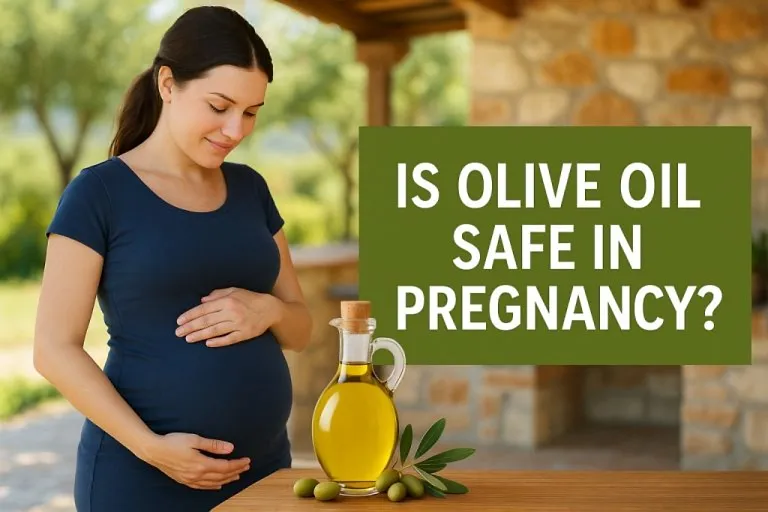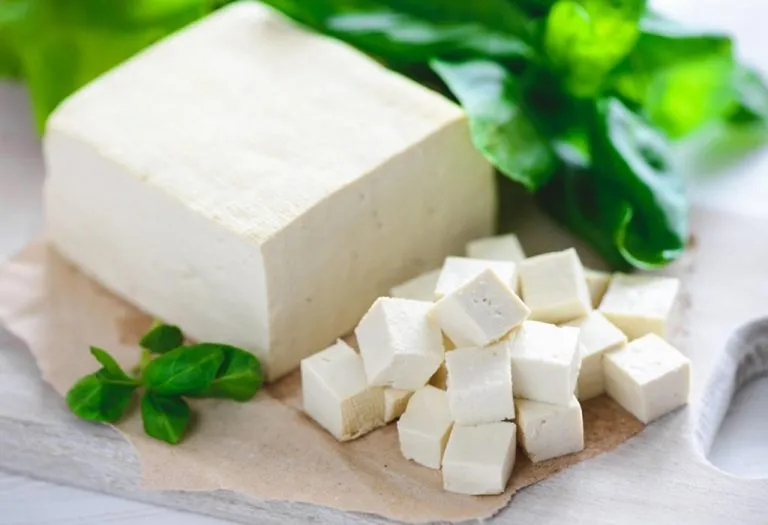Olive Oil in Pregnancy – Benefits, Side-effects, & Safety
Pregnancy is a time of significant change and heightened awareness regarding health and nutrition. Expectant mothers often scrutinise their diets to ensure the well-being of both themselves and their developing babies. One common question is the safety and benefits of using olive oil while pregnant. Olive oil, renowned for its health-promoting properties, has been a staple in Mediterranean diets for centuries. Olive oil and pregnancy are often discussed together due to the many nutritional benefits olive oil can offer during this crucial period. So, if you are contemplating whether olive oil is good for pregnancy, we recommend browsing through the following article. Here, we shall discuss everything you may need to know about adding olive oil to your pregnancy diet.
Is Olive Oil Safe During Pregnancy?
Before adding olive oil to your pregnancy diet, you should know whether it is safe for you. Olive oil is very safe to consume during pregnancy, and you may safely add it to your diet. It has many benefits for a pregnant woman. It is good for the to-be-mommy and has immense benefits for the unborn baby. We shall learn about its benefits in the following section.
Benefits of Olive Oil for Pregnant Women
Olive oil, derived from the olive fruit, is a staple in the Mediterranean region. It’s not just a dietary addition, but a health booster. Packed with dietary fibre, monounsaturated fats, Vitamin E, and iron, it’s a gentle and safe choice for pregnant women. Let’s explore how it can support you and your baby during this crucial time.
1. Vitamin E
Olive oil may not be a high source of vitamin E. However, because of its oxidation resistance, the quantity present offers ample benefits to a pregnant woman. Vitamin E is one of the components that help your baby to adapt better to the oxygen-filled environment soon after birth. If the mother of a premature or preterm baby consumes olive oil during the breastfeeding stage, it may help her baby to develop better kidneys and pancreas (1).

2. Beneficial in Foetal Development
Consuming olive oil during pregnancy may greatly benefit your unborn baby’s growth and development. Substantial omega-3 fatty acids are highly beneficial for your baby’s heart. It has also been observed that the consumption of olive oil during pregnancy improves brain function and development, and it also improves your baby’s learning skills as he grows. Also, if a mother consumes olive oil regularly during her pregnancy, it may positively impact the height and weight of her unborn baby (2).

3. Helps in Reducing Stretch Marks
Developing stretch marks is a common phenomenon during pregnancy, and most women may experience it. This may happen because as your baby grows, your pelvic muscles and abdomen stretch to accommodate your growing baby, which in turn may lead to stretch marks. Olive oil has been used for a long time to overcome the problem of stretch marks during pregnancy. If you keep applying olive oil on your tummy area every day, it is possible that you may not have stretch marks during pregnancy. And even if you do develop stretch marks, they may become light or, in some cases, even disappear after regular usage. However, the only mantra you need to follow while using olive oil for stretch marks during pregnancy is to use it regularly (3).

4. Beneficial in Improving Reflexes in Babies
It has been observed that mothers who consumed olive oil regularly during their pregnancy gave birth to babies with better or improved psychomotor reflexes than women who did not consume olive oil during their pregnancy.

5. Helpful in Fighting Various Infections
Pregnancy may make your immune system sluggish and, thus, may make pregnant women more susceptible to falling ill with various kinds of infections. However, including olive oil in your pregnancy diet may prove to be beneficial. This is because olive oil is a rich Vitamin A source, which helps build a strong immune system. This may help in keeping various infections at bay. Also, Vitamin A is very beneficial for the eyes, and including olive oil in your pregnancy diet may not only ensure good eye health for the would-be mother but may also be helpful for the foetal eye development (4).

Side Effects of Olive Oil During Pregnancy
While olive oil is celebrated for its numerous health benefits, pregnant women must understand potential side effects. Although generally safe, there are a few considerations to keep in mind to ensure the well-being of both mother and baby.
1. Weight Gain
Excessive consumption of olive oil can contribute to unwanted weight gain due to its high caloric content (5).
2. Digestive Issues
Some pregnant women may experience gastrointestinal discomforts, such as diarrhoea or bloating, when consuming large quantities of olive oil.
3. Allergic Reactions
Though rare, olive oil can cause allergic reactions in some individuals, potentially leading to skin rashes or respiratory issues.
4. Blood Pressure Fluctuations
Olive oil has a mild blood pressure-lowering effect, which might concern those with already low blood pressure (6).
5. Nutrient Imbalance
Relying too heavily on olive oil for dietary fat can lead to an imbalance, depriving the body of other essential nutrients in a varied diet.
6. Interaction With Medications
Olive oil can interact with certain medications, particularly those affecting blood pressure and blood sugar levels, necessitating careful monitoring and consultation with a healthcare provider.
Precautions to Take While Using Olive Oil in Pregnancy
While olive oil offers many health benefits during pregnancy, it’s essential to use it correctly and in moderation. Here are some important precautions to keep in mind when using olive oil while pregnant:
- Choose Extra Virgin Olive Oil: It’s the purest form and contains the highest level of antioxidants and nutrients (7).
- Check the Expiration Date: Always use fresh olive oil, as old or rancid oil can lose its nutritional value.
- Use in Moderation: Too much olive oil can lead to unnecessary calorie intake and weight gain.
- Avoid Overheating: Cooking olive oil at very high temperatures can destroy its healthy fats and release harmful compounds.
- Store Properly: Keep olive oil in a cool, dark place to preserve its quality and prevent oxidation.
- Test for Allergies or Sensitivities: If using it on your skin, perform a patch test to avoid irritation.
How to Choose the Best Olive Oil?
Selecting the right olive oil during pregnancy is crucial to ensure you’re getting the maximum health benefits. With so many varieties available, understanding what to look for can help you make a safe and nutritious choice for both you and your baby. Here are some tips to help you choose the best olive oil:
- Opt for Extra Virgin Olive Oil: It’s the least processed and retains the highest level of antioxidants and healthy fats (7).
- Check the Label for Cold-pressed or First-pressed: These terms indicate minimal processing, preserving the oil’s nutrients.
- Look for Dark Glass Bottles: They protect the oil from light exposure, which can degrade its quality.
When to Consult a Doctor?
Although olive oil is generally safe and beneficial during pregnancy, certain situations may require medical advice. You should consult your doctor if:
- You experience allergic reactions such as itching, rashes, or swelling after using olive oil.
- You have digestive discomfort or notice any unusual symptoms after adding olive oil to your diet.
- You’re dealing with gestational health conditions like diabetes, high blood pressure, or cholesterol issues.
- You plan to use olive oil for medicinal or skincare purposes during pregnancy and are unsure about the right quantity or method.
FAQs
1. Is it safe to use olive oil for massage during pregnancy to prepare for childbirth?
Yes, olive oil can be used for perineal massage. This practice may help increase the elasticity of the perineum and reduce the risk of tears during childbirth (8).
2. Is extra virgin olive oil better than regular olive oil during pregnancy?
Extra virgin olive oil, often preferred, is less processed and retains more nutrients and antioxidants, making it a healthier choice for you and your baby (9).
3. How much olive oil should a pregnant woman consume daily?
Olive oil should be consumed in moderation, generally around 1-2 tablespoons per day, as part of a balanced diet to avoid excessive calorie intake.
4. Is olive oil massage safe during pregnancy?
Yes, olive oil massage in pregnancy is generally safe. It can help alleviate muscle tension, improve circulation, and moisturise skin. However, it’s essential to use gentle pressure and avoid certain pressure points that could trigger contractions. Always consult with a healthcare provider before starting any new massage therapy during pregnancy.
5. Are olives healthy for pregnancy?
Olives are healthy for pregnancy when eaten in moderation. They are rich in healthy monounsaturated fats, vitamins E and A, iron, and antioxidants that support heart health and fetal development (10).
Olive oil and pregnancy can be a beneficial combination. It is important to remember that olive oil, like any other oil, should be consumed in moderation. You may safely apply olive oil on your skin during pregnancy, but refrain from going overboard with its consumption and usage. In any case, you should get a go-ahead from your doctor before doing so, especially if you’re using it for the first time. This is because every pregnancy is different, and what may be beneficial and healthy for one woman may not be healthy for another.
Also Read:
Eucalyptus Oil when Pregnant
Tea Tree Oil during Pregnancy
Using Almond Oil in Pregnancy
Is It Safe to Use Oregano Oil while Pregnant?
Was This Article Helpful?
1. INTERNATIONAL OLIVE COUNCIL – OLIVE OIL, PREGNANCY AND CHILDHOOD
2. PubMed Central – Omega-3 Fatty acids and pregnancy
4. PubMed – Olive oil, immune system and infection
5. PubMed – Olive oil consumption and its repercussions on lipid metabolism
6. UC Davis Olive Center – Olive oil as medicine: the effect on blood pressure
7. Harvard Health Publishing – Is extra-virgin olive oil extra healthy?
10. Cleveland Clinic – 7 Reasons Why Olives Are Healthy for You


































